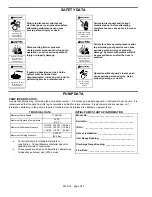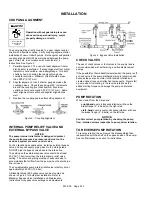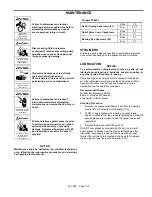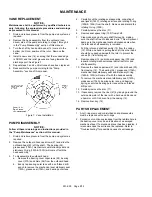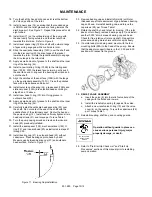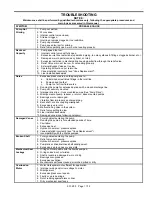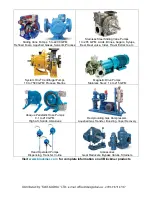
501-K00 Page 4/12
INSTALLATION
COUPLING ALIGNMENT
Operation without guards in place can
cause serious personal injury, major
property damage, or death.
Do not operate
without guard
in place
The pump must be directly coupled to a gear reducer and/or
driver with a flexible coupling. Verify coupling alignment after
installation of new or rebuilt pumps. Both angular and parallel
coupling alignment MUST be maintained between the pump,
gear, motor, etc. in accordance with manufacturer’s
instructions. See Figure 3.
1. Parallel alignment: The use of a laser alignment tool or
dial indicator is preferred. If a laser alignment tool or dial
indicator is not available, use a straightedge. Turn both
shafts by hand, checking the reading through one
complete revolution. Maximum offset should be less
than .0005" (0.127 mm).
2. Angular alignment: Insert a feeler gauge between the
coupling halves. Check the spacing at 90° increments
around the coupling (four checkpoints). Maximum
variation should not exceed 0.005" (0.127 mm). Some
laser alignment tools will check angular alignment as
well.
3. Replace the coupling guards after setting alignment.
Figure 3 – Coupling Alignment
INTERNAL PUMP RELIEF VALVE AND
EXTERNAL BYPASS VALVE
NOTICE:
The pump internal relief valve is designed to protect
the pump from excessive pressure and must not be
used as a system pressure control valve.
For ALL liquefied gas applications, install an external bypass
valve, and any necessary piping, back to the storage tank.
DO NOT pipe the bypass valve back to the intake line.
The setting on the external bypass valve should be at least
25 PSI (1.7 bar) lower than the internal pump relief valve
setting. The valve and piping must be of adequate size to
accommodate the full flow from the pump when the discharge
line is closed.
The non-adjustable pump internal relief valve is factory set at
approximately 225 PSI (15.5 bar).
A Blackmer Model BV bypass valve can be mounted as
shown in Figure 4 for bulk plant installation. Refer to
Blackmer Bypass Valve Installation and Maintenance
Instructions for bypass valve settings and adjustments.
Figure 4. Bypass Valve Installation
CHECK VALVES
The use of check valves or foot valves in the supply tank is
not recommended with self-priming, positive displacement
pumps.
If the possibility of liquid backflow exists when the pump is off,
a check valve in the pump discharge piping is recommended
because the pump can motor in the reverse rotation and
create undue stress on all attached components. Never start
a pump when it is rotating in the reverse rotation as the
added starting torque can damage the pump and related
equipment.
PUMP ROTATION
When viewed from the driven end:
a
right-hand
pump (clockwise rotation) will have the
intake flange (2”, 8 bolts) on the right side.
a
left -hand
pump (counter-clockwise rotation) will have
the intake flange (2”, 8 bolts) on the left side.
NOTICE:
Confirm correct pump rotation by checking the pump
flow / rotation arrows respective to pump driver rotation.
TO REVERSE PUMP ROTATION
To reverse rotation, the pump must be disassembled then
reassembled with the shaft on the opposite side of the pump.
See the ‘Maintenance’ section for instructions.


